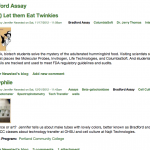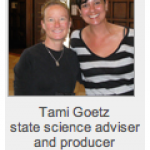Bio-Link
A simple web search says biotech is really big. One estimate indicates that the industry will have $400 billion in sales in 2017 with growth to over $775 billion by 2024 [1]. Another report suggests there are over 77,000 employers [2]. That’s big, but is it real, and what you can do with this information?
Worldwide locations of biotechnology employers. Source Biotech-Careers.org
At Biotech-Careers.org we're interested in helping students and graduates of biotech programs at community and four-year colleges learn about the multitude of opportunities available in the…
Why should students blog about science? Don't they have enough to do already?
Last Thursday night I participated in a panel discussion about science blogging (see the video) at ScienceOnline Seattle (#scioSEA)(video) and mentioned that we have two students blogging for us at Bio-Link. A question I saw afterward via Twitter, from @NurhafizPiers was this:
what is the purpose of the blog for the student?
I didn't get to answer the question Thursday night, so I'll answer now.
We're doing an experiment. My student bloggers and I are going to try and figure out if their blogs…
If you want to work in biotech, you have to get work experience. But, how do you find it?
One way to find work experience is to do an internship.
When do I look?
If you're a college student, and you're planning to wait until spring to apply for a summer internship, you're waiting too long. The time to look is NOW. Many of the best internship opportunities appear between the beginning of December and end of February.
Where do I look?
As far as where, quite a few places have regular internship programs. I listed some examples below.
[View the story "'tis the season - to apply for summer…
If all the information you had about scientific careers came from newspapers or TV, it would be easy to think that everyone who works in life sciences / biotechnology is either a Ph.D. scientist, post-doc, or graduate student. In reality, the life sciences are more like an iceberg. The public sees the people at the top, with advanced degrees, while the many people who have bachelors or associates degrees are hidden from view.
The NIH has realized that a fair number of people they hire are community college graduates who have associate degrees in…
Like everything else, if we want to know what's going on, we have to ask.
So, it's time once again for the 2011-2012 National Biotechnology/Life Sciences Program Survey.
Yes, indeed.
Federal and state agencies will use the results to determine how best to support programs like yours. This study will also help prospective students and industry employers find your program. Survey results will be available to you to help with program planning, grant activities, and more.
We only want one person from each biotechnology / biomanufacturing / bioscience program to complete the survey. If you are…
What roles should community colleges play in training the bioeconomy workforce of the future?
Send your answers to bioeconomy@ostp.gov by Dec. 6th.
One night towards the end of October, we happened to meet with someone who could tell us more.
We asked him about a request for information (RFI) soliciting input on the bioeconomy, that some of us saw posted on the Federal Register web site.
"What could information could we provide?," We asked (a little skeptically).
"Does the Whitehouse really want our input on ways to stimulate the bioeconomy and build the bioscience workforce?"
"Yes," he…
"It's all about saving Aunt Millie"
Bob Swanson
Co-Founder of Genentech
I just learned today that Jim DeKloe, who wrote this post as a guest author a few years ago is giving a webinar on May 11th on protein purification from industrial enzymes to cancer therapy.
Jim's webinar, offered through Bio-Rad, has two sessions at 3 pm Eastern and 7 pm Eastern. Registration is free and you can register HERE.
Jim is one of the most inspirational educators I know and he's the sort of person that reminds you why educating students about biotechnology careers is important. His moving story is one that…
It only takes a quick trip to the grocery store to see that familiar jobs are vanishing. Unless you're in Oregon, grocery store checkers are going the way of gas station attendants, travel agents, and secretaries. Jobs are changing, new jobs require different skills, and even those jobs will be obsolete within a short time.
Community colleges can cushion the blow by developing education programs in response to the needs of their local communities.
Not only do these programs help displaced workers, they help their communities attract new businesses and support economic growth. Georgia's…
Last summer, I had the good fortune to attend a conference in Washington D.C. on Vision and Change in Undergraduate Biology education. There were lots of inspiring speeches, cool videos, and talks about building more student-centered classrooms and strategies for change.
Surprisingly, many of the attendees seemed unaware that there is a group of instructors, and educational programs who embody this vision, albeit with a bit of twist.
These are the biotech instructors and biotech education programs at the community colleges.
Many of the ideas described at the Vision and Change conference…
Every June, an incredible event takes place.
Biotechnology educators gather in Berkeley, California, from across the US, to discuss new trends in biotechnology education, learn from each other and share information about educating students for the biotechnology workforce.
There are tours of local biotech companies like Genentech and local research institutes like the cancer center at UCSF. New kits and techniques can be tried and practiced in hands-on workshops. And instructors get to practice new bioinformatics techniques like analyzing Next Generation DNA sequencing data or working with…
Well, I had to test Scribd with something. Why not use a document on the Massachusetts Life Sciences Industry?
Scribd is sort of like the YouTube of electronic paper. I found Scribd from TomJoe's post about Life on Mars. His PowerPoint talk is really much more interesting than the life science document that I uploaded as a test, but since you're here anyway, you might as well take a look.
What does Scribd do?
It solves the "waiting for another application to open" problem that I find so frustrating when I want to quickly read (okay, skim) a pdf document that's linked from something on…
What skills does a biotechnology technician need to know?
This seems like a simple question, but people have been struggling to define biotech skill standards since the early 90's.
Complicating this question is that many areas of biotechnology require somewhat different skills. Antibody work requires one set, plant or animal tissue culture, another; fermentation, another; manufacturing, another; DNA sequencing, yet another set. Even skills that you might think are universal, like using a microscope, are not. During my years in graduate school, I never used a microscope; I cloned genes…
Over the years, I've seen many biotechnology education programs at community colleges embrace outreach to high schools as part of their mission. This kind of enthusiasm for outreach seems unique to biotech. No other kind of science or engineering program seems to do this sort of thing, at least not on the nationwide basis that I've seen demonstrated in biotechnology.
And yet, even though I've always admired and often participated in these efforts, some aspects are a little puzzling.
How do the colleges reconcile the energy spent in outreach efforts with the energy spent towards educating…
Long Branch, NJ, is a lovely town on the Atlantic Ocean, with long beaches and brand new shops and condos. It is also part of an area in, central New Jersey, where biotechnology education is entering an exciting time thanks to efforts of NJBEC, Bio-1, and a WIRED grant from the U.S. Department of Labor.
NJBEC, Bio-1, WIRED? What do all these acronyms mean?
I get these things confused all the time, so I'll take a quick moment and explain.
NJBEC is the New Jersey Biotechnology Educators Consortium. Bio-1 is a partnership between five counties and several schools in central New Jersey, that…
Students in the United States take many convoluted and unnecessarily complicated paths when it comes to finding careers in biotechnology. If Universities and community colleges worked together, an alternative path could benefit all parties; students, schools, industry, and the community.
The image below illustrates the current paths and the approximate time that each one takes.
I was at two meetings recently, one in Arizona and the Bio-Link workshop in Berkeley, where we spent time discussing the paths to careers in the biotech industry. You might think, if you consider the number of years…
I'm in Berkeley right now at the annual Bio-Link Summer Fellows forum. We're getting to hear talks from people in the biotech industry, listen to enthusiastic instructors describe their biotech programs and ideas, and try out new educational materials.
Yesterday, two speakers (Damon Tighe and Jason Baumohl) from the Joint Genome Institute in Walnut Creek, CA, gave a fun talk about DNA sequencing and sequence assembly.
They also showed some very nice Flash animations, made by Damon Tighe, at the JGI, that illustrate how DNA sequencing is done. There's no sound, but the animations are…
A little over ten years ago, Dr. Elaine Johnson obtained funding from the National Science Foundation to start Bio-Link, an Advanced Technology Education center, focused on biotechnology. Since that time, Dr. Johnson has become a national leader in biotech education, enlisting the country's top educators and industry captains to ensure that community college students receive a quality education and the best preparation possible for entering the workforce.
In this radio interview from Tech Nation, Dr. Johnson talks with Dr. Moira Gunn about the easiest way to a biotech career.
A Career in…
In part I, I wrote about the shortage of technicians in the biotechnology industry and the general awareness that this problem is getting worse. This part will address the challenge of getting more students into programs that will prepare them for jobs in the biotech field. I've also been asked to write a bit more about finding jobs in companies, that post will be a bit later. Before proceeding, there are two points that need a bit of discussion. The first point is the whether there's a shortage at all and the second applies to the kind of shortage.
It's hard to see the forest when you're…
Community colleges are such extraordinary places that even California's governor, Arnold Schwarzenegger credits his time at Santa Monica community college as one of the secrets to his success.
From the SF Chronicle:
"People always ask me 'What is the secret of your success?' " he said Tuesday. "I always say, 'Come to America. Go to community college. And marry a Kennedy. It's all very simple.' "
HT to Jim DeKloe.
Bio-Link is accepting applications for this year's National Summer Fellows forum, June 2-6th, in Berkeley, CA.
You can get an application at www.bio-link.org
I'll be there, doing some kind of bioinformatics workshop. I'll probably be talking about either metagenomics or comparing protein structures and drug resistance, but if you have topic requests, feel free to submit them in the comments.


